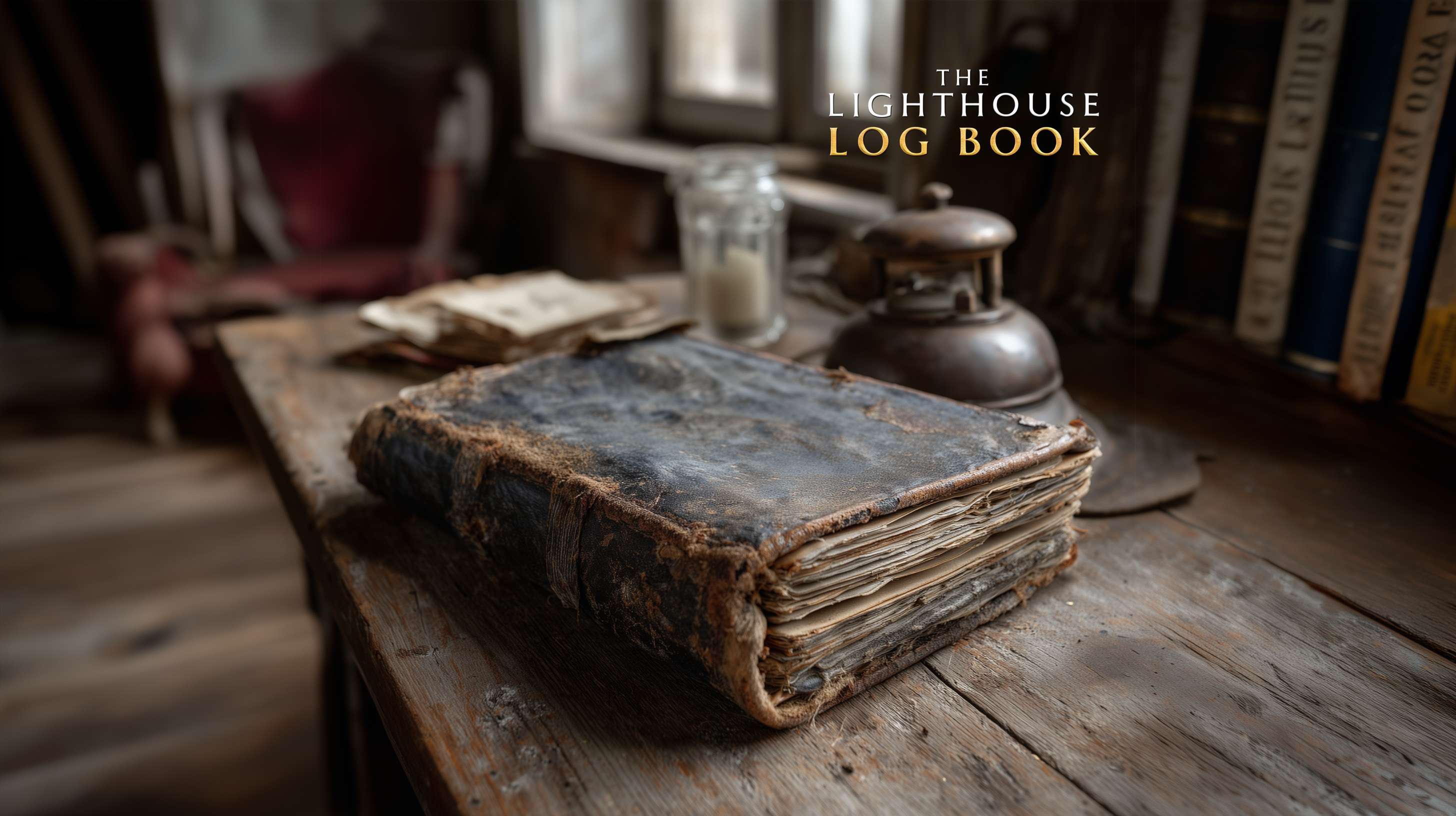A lone sailor finds a forgotten logbook whose final note of joy reawakens his will to reconcile.
The Lighthouse Logbook
The storm rolled in early, flattening the horizon into a sheet of iron.
Eli Watterson had been hauling diesel drums and food crates since dawn, but by mid-afternoon the sky broke open, churning the sea into a mess of white teeth and black troughs. Captain’s orders were to cut north for shelter. The only place in reach was the lighthouse—Island Point, abandoned since before Eli was born.
It sat there on the cliff like something God had started carving and then set down mid-chisel—square stones, weathered down to the bone, windowpanes glinting dim under the wash of rain. The supply boat nudged into the half-collapsed dock, ropes snapping tight. Eli went ashore alone.
Inside, the place smelled of wet limestone and a kind of old, boxed-up loneliness. The oil lamps were gone, the kitchen stripped bare, but the walls still held the sound of the storm in their hollows. Upstairs, the keeper’s office had one crooked desk, a tipped-over chair, and a set of drawers swollen with damp.
It was in the bottom drawer that Eli found it: the logbook.
A ledger-sized volume bound in cracked black leather, the spine softened to threads.
The first page was dated March 3, 1928.
March 3, 1928
First day. They told me I’d feel the satisfaction of a necessary man, standing guard for ships, saving lives unseen. What I feel is the wind cutting the skin off my ears. The lamp is no friendlier than a blacksmith’s forge. My wife says she’ll write often. My boy says nothing.
March 15, 1928
She sent a letter, though it said less than the envelope. Mostly, the cost of coal back home, the price of mackerel. She signed it “Yours” instead of “Love.” That’s the part I keep reading over.
April 2, 1928
Fog thick today—like holding your head inside a sack. Three ships passed, none close enough to see my light. Feels like I’m shining it into nothing. The gulls are fat from the bait buckets I toss over. I have named one of them Robert after my son. It circles without landing.
May 10, 1928
I am tired of beans. I am tired of the lamp’s hum. I am tired of my face in the shaving glass. I think of walking into town for a meal that tastes of pepper and meat, but the boat only comes twice a month, and last time I missed it, chasing a torn sail in the wind. It was not worth it.
June 1, 1928
Another letter. She wrote that Robert is apprenticing with a carpenter. Said he’s “keeping busy.” The words taste like gristle in my mouth. He hasn’t once written me himself. A man might begin to think he is already dead in the boy’s mind.
June 22, 1928
The sea is cruel in summer too. It sends its heat up the stones until the air feels baked. Flies get into the pantry. I slapped one against the wall and stared at its body for nearly an hour. It was something to do.
July 14, 1928
This job is supposed to be for those who can stand their own company. Maybe I am not that man. I talk aloud sometimes, not to God, just to the walls. There’s a difference.
August 5, 1928
Saw a steamer turn away from the shoals today. I suppose that is the point. But you can’t frame the absence of disaster. You can’t hold it in your hands. It’s like sweeping a floor just to watch it gather dust again.
September 3, 1928
The gull I named Robert hasn’t come back. I tell myself it’s nothing. I tell myself many things.
October 12, 1928
They say the mainland is having an early frost. I’ve had frost in my bones since spring. The lamp glass cracked in the cold. I repaired it, but the wind keeps finding its way in. That’s the nature of things—cracks and wind.
November 1, 1928
No letter this month. The silence is heavier than the fog. I keep thinking I might write something to the boy—something about carpentry, something that would sound like a father’s interest instead of his ache. But I crumple the page each time.
December 25, 1928
Christmas. One tin of peaches left. I opened it. Ate slow. Told myself the sweetness meant something. Didn’t feel it.
January 14, 1929
It’s been near a year now. My wife says Robert’s moved out, renting a small room above a shop. She says he is “finding his way.” It’s a phrase for people you no longer hold onto.
February 2, 1929
I think often of just letting the lamp go dark. Not from malice—just to see what would happen. But there’s the chance a ship might be near. And I can’t quite stomach having the rocks tell my story.
March 9, 1929
No ships for three days. I could scream across the water and only the wind would answer.
April 6, 1929
They sent me extra oil this month. As if burning more of it would make me warmer.
May 3, 1929
The gull came back. Or one like it. Hard to tell after a winter. I called it Robert anyway. It landed this time, bold as you like, staring at me with black bead eyes. I wanted to tell it news of the shore, but I had none.
June 11, 1929
Two years on and I know the knots in the floorboards better than my own hand. One of them looks like a closed eye.
July 29, 1929
Storm last night. Big one. I worked the lamp till my arms burned. This morning, wreckage floated past—part of a hull, a chair leg. No bodies. No thanks either.
August 18, 1929
The boy is twenty now. I wasn’t there for it. I wasn’t there for anything. This work takes from a man even as it pays him.
September 30, 1929
The sea is a liar. It shows you calm just before it takes you under. I watch it from the lamp room, and I swear it watches back.
October 15, 1929
Dreamed last night that I was home, standing in the doorway, watching Robert plane a board smooth. He didn’t look up.
November 5, 1929
Winter starting in earnest. Stove smokes. I keep the log for duty, but it feels like talking into an empty jar. Maybe that’s all it ever was.
Eli turned the page, half-expecting more of the same.
Instead, the handwriting was different—less cramped, the ink rushed:
December 9, 1929
Saw her—saw the light hit her hull just so. Watched her swing wide of the Devil’s Teeth, the whole deck alive with motion. She made it through. God help me, it was beautiful. I think… it matters. More than I knew. More than I can say.
That was the last entry. No final note. No explanation. The keeper’s name wasn’t even in the book.
Eli sat in the office until the storm thinned into drizzle. He read the last page again, then the first, then the last again.
It itched at him.
Not just the joy—though it was strange, coming out of nowhere like that—but the gap afterward. What had the man done next? Gone home? Stepped into the sea? Stayed another year and written nothing?
Eli thought of his own son—Mason—twenty-six now, somewhere in Florida. They hadn’t spoken in five years, not since the fight about Eli missing the wedding for a double shift on the boat. Mason’s voice in that last call had been flat as tin.
Eli had told himself it was mutual silence. But sitting in that office, with the smell of mildew and lamp oil, he felt the word the keeper had been circling for two years: gone.
Back on the boat that night, the rain dripping off the brim of his cap, Eli kept seeing the image the keeper had left—the ship clearing the rocks, alive with motion. He didn’t know why it mattered, only that it did.
By the third day, he had Mason’s number in his hand.
By the fifth, he called.
The phone rang four times.
“Dad?” Mason’s voice, wary.
Eli cleared his throat. “Saw a boat come through the rocks the other day,” he said, as if that explained everything. “Just thought you’d want to know.”
The Lighthouse Logbook
The Lighthouse Logbook is a sparse, haunting folk ballad based on short story, The Lighthouse Logbook. It is about a supply boat worker who takes shelter in an abandoned lighthouse during a storm. There, he finds the old keeper’s logbook, its pages mostly filled with loneliness, bitterness, and small details of an isolated life. The final entry, written just before the keeper vanished, unexpectedly bursts with joy at seeing a ship pass safely through the rocks. The discovery lingers in the worker’s mind, giving shape to his own unspoken estrangement and prompting him to reach out to his son.
Lyrics
The storm came early.
Wind pushed the water like it meant to crush the shore.
The boat groaned.
I saw the lighthouse on the cliff—dark, no light.
I tied up in the cove and climbed the hill.
The door was open. Salt smell.
Inside: cold air, dust, gull cries slipping through broken panes.
A desk.
One drawer stuck. I pried it open.
A logbook.
January 3
Cold cuts the bone.
Family writes from the mainland. Too busy to visit.
January 12
Nothing today. The sea looks tired.
I feel the same.
February 5
Oil for the lamp late again. Supply boat useless.
Fog horn moans.
Feels like it’s for me.
March 9
Dreamed of my wife. Woke angry. Don’t know why.
April 14
Saw a ship drift too close to the rocks.
Yelled at the sea. Sea didn’t care.
May 1
Rain all week.
Knees ache.
Wouldn’t mind if the waves took the tower.
June 11
Ate the last apple. Rotten in the middle.
Like me.
July 2
Letter from my boy. Says he’s fine.
Three lines.
Don’t know if I believe him.
July 28
Lamp broke. Fixed it. Doesn’t matter. No one sees it anyway.
August 16
Lonely.
So lonely I thought about talking to the gulls.
September 5
Drunk.
No more to say.
September 17
Storm last night. Waves beat the tower.
Almost wished they’d win.
October 8
Letter from wife. Says the boy’s moved out.
Didn’t tell me where.
November 20
Silence all day.
Feels like the world forgot me.
December 4
Saw my reflection in the glass.
Didn’t recognize it.
December 11
Snow. Bitter wind.
No one is coming.
December 19
Dreamed I was on the mainland.
Woke up with salt on my lips.
December 23
Oil came. Late again. I swore at the sky.
Sky stayed blue.
January 2
New year. Feels like the old one.
January 7
Read old letters.
Wish I hadn’t.
January 28
Thinking about leaving.
No place to go.
February 15
Sea calm.
I am not.
March 1
Ship came close today.
Could hear men laughing.
March 19
My hands shake when I light the lamp.
Don’t know if it’s the cold.
April 2
Feels like nothing will change.
April 9 (final entry)
Today—
Saw a ship pass the rocks.
Safe. Clear.
The lamp worked.
That’s all.
I sat there a long time.
The wind rattled the glass.
The sea kept moving.
I thought about my boy.
I thought about the last entry.
I wondered where the keeper went after that.
I wondered why that one day mattered.
I kept the logbook.
Two days later, I made the call.
Read more articles
- Log in to post comments

